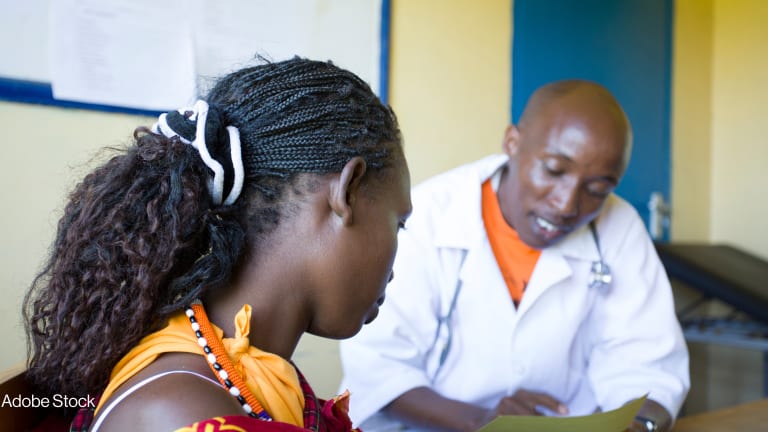
If there is one thing the ongoing pandemic has taught us, it is that robust and resilient health systems are critical to effectively managing, mitigating, and responding to public health emergencies. While a health system has many components, the frontline health workers are arguably the most visible and essential — without them, no one can get the care they need. Unfortunately, most low- and middle-income countries lack an adequate number of competent FHWs to meet the needs of their population.
Bihar, India, is a particularly challenging place to provide health services. Bihar is one of the poorest and most densely populated states in the country, with a largely rural population of more than 104 million. While India has an overall shortage of health care workers and health centers, Bihar’s situation is particularly dire with less than 1 health care worker available per 1,000 people.
With sustained and significant support from the state government and the Bihar Technical Support Program, Bihar has seen remarkable impact at scale between 2005 and 2018.
Maternal mortality rates have fallen steeply from 312 to 165 maternal deaths per 100,000 live births, more children are being fully vaccinated — the percentage of 1-year-olds with completed immunization schedules increased from 18.6% to 84% — and progress has been made toward eliminating infectious diseases such as visceral leishmaniasis. FHWs’ capacity to deliver health services is a key pillar of the Bihar government’s response to the COVID-19 pandemic.
While a health system has many components, the frontline health workers are arguably the most visible and essential — without them, no one can get the care they need.
—The BTSP team designed and implemented a number of interventions focused on meeting the needs of FHWs. These included: providing opportunities for professional development and supervision; improving health care service quality; and building and strengthening systems and processes FHWs rely on to do their jobs.
1. Improve FHW performance by investing in continuous training and supportive supervision
The Bihar Technical Support Program
Over the past 10 years, CARE has partnered with the Bihar government to address maternal and child mortality indicators by strengthening the state health system and working with some 200,000 FHWs. The program is supported by the Bill & Melinda Gates Foundation.
In Bihar as in other low- and middle-income countries, community health workers provide in-home counseling, health, and hygiene education along with basic maternal, newborn, and child health and nutrition services. Although millions of families rely on these hard-working FHWs, many of them receive only weeks or months of training before starting their work, with limited opportunities for supervision and skill-building along the way. To address this, the BTSP team designed short, participatory, refresher training for community health workers, offered at a time convenient to them.
For facility-based nurses and auxiliary nurse midwives, or ANMs, who provide skilled birth attendance and manage life-threatening complications in pregnant women and newborns, BTSP brought highly skilled nurse mentors to the health centers to provide in-service, on-the-job training and mentoring.
In response to the pandemic, BTSP is providing infection prevention and control training for health care workers and support staff, including lab technicians, ambulance drivers, and emergency medical technicians.
2. Invest in health facility-based improvements to boost health care worker morale
BTSP also provides technical support to improve the quality of health service delivery at government-run health facilities by upgrading infrastructure and equipment, and updating standard operating procedures, systems, and processes.
CARE built cross-functional teams with representatives from all facility staff, from nurses and doctors to managers, storekeepers, and ancillary staff. These teams would then lift up and address the many challenges across the different dimensions of the operating environment, coordinating assessments, key actions, and ongoing monitoring.
The first steps these teams often take is to paint walls, improve landscaping, and organize labor rooms, operating theaters, and storerooms — basic tasks that have a high visible impact and provide an immediate boost to staff morale. Recent efforts have focused on readiness/response assessments and setting up isolation wards and processes to appropriately manage COVID-19 cases.
3. Equip FHWs and their supervisors with digital tools and data to improve service delivery
The BTSP team also recognized the need for a technology solution that would enable FHWs to provide better care and to link the client-related data they collect to their supervisors and to the health system itself. CARE and the Bihar government co-designed and iterated a mobile application in collaboration with FHWs — now known as the Common Application Software, or CAS — to allow workers to electronically register and track patients and manage their care.
CAS includes several modules to support FHW decision-making, offering counseling aids, clinical protocols, and checklists at their fingertips to help them personalize counseling sessions and quickly identify danger signs. The app contributed to a rise in home health visits from 37% to 88% in one year according to internal BTSP concurrent measurement and learning survey data, and in 2015 it was scaled up by the Indian government across all 28 states.
All this work has paid off. Government monitoring surveys have shown increases in a range of evidence-based practices and services, and the quality and quantity of FHW counseling has improved.
FHWs report that they feel more competent, confident, motivated, and proud, and prior to the pandemic, health facilities have seen massive increases in client visits, from single digits to up to 10,000 a month in some health centers. These solutions, successful enough to be taken to scale across Bihar and in some cases India, were sparked by a deep and abiding appreciation of the courage, service, and impact of FHWs.
Learnings from Bihar demonstrate that FHWs are critical to responding to crises like the pandemic. These caregivers risk their lives every day to provide services to those in need, serving as a critical link between the community and its health care facilities. Investing in FHWs and enabling them to do their jobs well should be central to any health systems strengthening effort.
Visit the Duty of Care series for more coverage on how health systems can function better so that health care workers are supported and protected. You can join the conversation using the hashtag #DutyOfCare.










